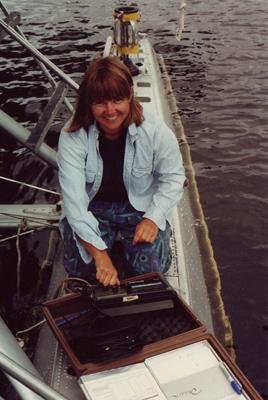Meet EPA Research Scientist Anne Neale

Exploring the connections between ecosystems and people
EPA research scientist Anne Neale’s career has included fighting forest fires in Montana, scooping up water and sediment samples from float plane pontoons in the Northeast, and helping with the response efforts after the Exxon Valdez oil spill disaster in Alaska. Anne has a background in landscape ecology and for her current work, she studies how different kinds of landscapes and land uses affect human well-being, public health, and the ability of natural systems to function. Anne is very passionate about her work and how it matters, but still wishes she had more time to spend outside!
How does your science matter?
My colleagues and I are uncovering new relationships between elements of the environment, specifically those relating ecosystem health to human health and well-being. And what’s really exciting is that we are not only developing the data, but making it widely available and easily accessible—putting it into the hands of a really wide audience who can use that information to make decisions and to conduct further research. We are providing a portal to a wealth of environmental, social, and economic data that can support many, many different types of decisions. It’s also a phenomenal education tool.
What do you like most about your research?
What I really love is turning data into information that people can use. My work involves combining rich databases with maps, using geographical information systems (GIS). I love opening up the world of maps to nontechnical audiences—putting maps into the hands of everybody.
I enjoy working with a phenomenal team of folks including other EPA scientists, partners from other organizations, research fellows, and Student Services Contractors. We have a truly incredible team and I especially enjoy the energy and talent of the young scientists!
What are some current projects you are working on?
One of our biggest recent projects is the EnviroAtlas. It is a web-based tool that combines an array of resources such as interactive maps, analysis tools, fact sheets, and downloadable data to allow users to understand the interactions between people and the environment. It is very user friendly and doesn’t require a technical background. Our team is developing the wealth of data that goes into EnviroAtlas as well as developing the application itself. As I mentioned previously, I love putting maps into the hands of decision-makers, other researchers and analysts and educators.
If you could have dinner with any scientist past or present who would it be and what would you like to ask him or her?
I would love to have dinner with my freshman year environmental science college professor. I would like to chat with him about the things we learned over thirty years ago. Our class was a fairly general environmental science class, but we went on a lot of field trips and covered a broad range of topics. It was an inspiring class and had a significant impact on my career path and I would like to let him know that his teaching had made a difference. I remember our textbook included a chapter on the possibilities of climate change and the text was written hypothetically, like this could maybe, possibly, happen someday.
If you weren’t a scientist what would you be doing?
If I wasn’t a scientist, I could see myself being a veterinarian which I suppose is another kind of scientist. I have always loved animals. I could also see myself working for a politician that I believed in.
If you could have one super power what would it be and why?
If I could have one superpower it would be to show people how important the environment is to their well-being and health before it’s too late. To be able to just blink my eye and tell them everything they need to know to understand how important a healthy environment is, that would be awesome.
